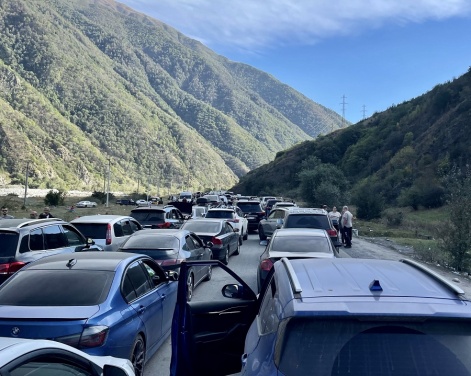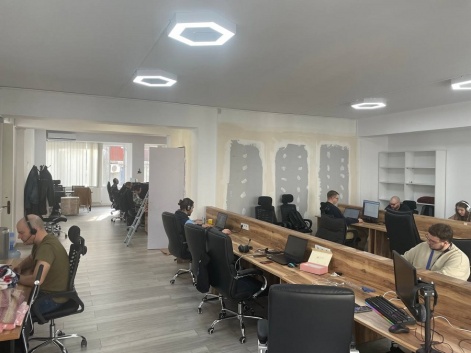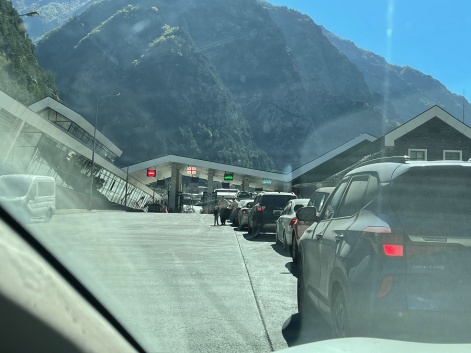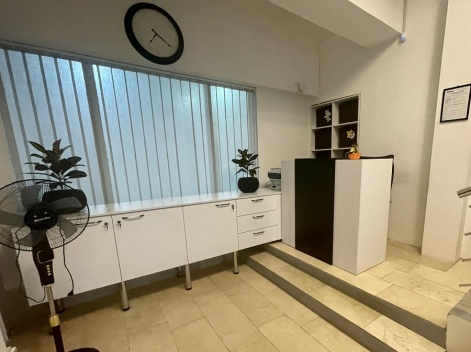After the outbreak of the conflict in Ukraine, international mobile game developer and publisher Azur Games joined the list of companies that shut down their business in Russia. Azur Games sold shares in all local development studios and helped relocate employees who were still in Russia.
The team was getting out of the country, leaving their homes and belongings behind, and a lot of work was put on hold. The people working in the offices in the West were busy helping their colleagues relocate. Meanwhile, plane tickets were selling out and traffic jams at the country’s borders stretched for miles and miles.
Azur Games co-founder Dmitry Yaminsky shared the company’s reasoning behind the decision to leave the market, the consequences, and the employees’ reaction to this.

PocketGamer.biz: You recently announced your complete withdrawal from the Russian market. How did it go?
Dmitry: We started preparing for relocation at the end of February but everything that transpired showed us that first and foremost, the people were at risk, not just some projects. A lot of them have families and pets, need to get certain documents, pack things, visit a doctor before leaving, find time to sell some stuff, and so on. We wanted to take care of all our employees of various levels and qualifications. So we took our time and built the most painless and comfortable moving process for everyone.
The business side of things was easier to deal with — we announced we were selling shares in all our Russian and Belarusian assets back on September 19. At that time, some of our own developers were still located in these countries, although many had already moved. On September 21, Russia announced the start of mobilization — in the blink of an eye, the preparations that took us months became useless.
We were extremely worried and felt a great responsibility for our employees. After all, everyone needs the means to live, provide for their families, raise children, and just feel stable. Everything was falling apart before our eyes.
And that’s when you decided to relocate all your employees from Russia?
Dmitry: After September 21, there was no time left to organize everything. We had to quickly curtail projects, put critical tasks on hold, postpone updates and new releases — the work that’s critically important for the company’s future just stopped, basically overnight.
We no longer considered losses, just literally grabbed at every opportunity to help people without caring about bureaucracy. We were taking care of lots of issues as we went. At the same time, all plane tickets from Russia were basically sold out, and traffic jams at the land borders with neighboring countries stretched for miles. If you wanted to leave during those first days, there weren’t a lot of options: you either had to spend thousands of dollars on tickets, or be stuck at the border, risking getting drafted right then and there. Not to mention the fact that many countries closed their borders and stopped issuing visas to Russians.
Many of our employees decided not to wait until we’re able to offer help and started to leave right away: some bought the last remaining plane ticket to the only country that was still available for $5-10 thousand instead of the usual $500, some spent a week in the car with their family and cat, and some traveled, crossing three countries to get to a new office.
Can you tell us more about the new office?
Dmitry: We chose Batumi, Georgia mainly because of the logistics and the fact that it was possible to put our employees’ lives on track quickly there. Now the company has a whole department that specifically deals with relocation issues, but this isn’t enough; we need to cover many problems, from legal and financial ones, to everyday things and mental health issues. In Georgia, this is easier to do than in many other countries.

Our people who have already moved and managed to settle down joined in to help. There was an exceptionally difficult period when our relocation department physically couldn’t deal with the number of tasks they had. The team started helping each other and does this to this day, which is priceless. As they say, it takes a village, and our priorities have shifted very fast.
Organizing something like this must be expensive, hence the question: how tangible was the exit from the Russian market for Azur Games from a business standpoint?
Russia has never been a key market for us, the share there has always been small. Azur Games is an international company with offices around the world that focuses on the Western market. That’s why the decision to leave was natural both from the business point of view and from our attitude towards what’s happening. However, no work task can even come close to the amount of energy we had to spend.
After the February events, it became clear that something had to be done immediately, and that we had to help the employees first and foremost. Not only because of the sanctions or companies and services leaving, but because of the unstable political situation within the country and simple human principles. Therefore, we decided to relocate the entire team from there, focus on our main offices and open at least one more.
Are there no assets left in Russia at all?
Dmitry: No, nothing. In the past we were developing some things there, were present on the M&A market and invested in studios, but we quickly decided to shut down all lines of business. We sold the last shares in five Russian and Belarusian studios to the management of these companies.
Azur Games is headquartered in Cyprus with a back office in Dubai. That’s where all our intellectual property is developed and all trademarks are accumulated.
Cyprus is well suited for developing complex products with in-app monetization, so the mid-core department is concentrated there, and Dubai is a great hub for launching products with ad monetization, we work on hyper-casual projects there. These are our two main areas, although making hit games isn’t the top thing that’s currently on our minds.
Did you expect geopolitical conflicts to affect the gaming industry?
Dmitry: There was a feeling that something was about to happen, but no one expected this kind of blow. At the same time, geopolitics is only the tip of the iceberg, there’s also a steep decline in the market that should be taken into account.
During COVID, hyper-casual developers were investing heavily, and the market experienced rapid growth. In the first quarter of 2020 the total number of downloads had increased by 38%, and the revenue had grown by 25%. Then the pandemic ended, and people started returning to their normal lives, so there had to be some kind of stagnation, even though the market looked pretty good. However, it didn’t just stagnate, the whole hyper-casual market started declining. In the first quarter of this year, it lost 8% of its volume. If we talk about installs, the total amount has decreased by approximately 11% compared to 2019. The eCPM rate peaked in December 2021. After that, it’s been changing slightly, but there was no growth. Now there’s a tendency for it to decrease.
Generally speaking, the military conflict accelerated and exacerbated the worst predictions.
How difficult was the relocation for the employees themselves?
Dmitry: It remains challenging to this day. Despite the fact that many employees began to leave on their own, and we have a whole department that specifically deals with relocation, there are still not enough hands to solve the huge number of various issues we’ve encountered.
Relocation is not a two week business trip, you fully move to a different reality. This is an extremely difficult process, not only legally and financially, but also mentally. People deal with anxiety, some with depression which you can’t just turn off when you please. We talked a lot with those people, tried to calm them down, surround them with support, and help overcome difficulties.
Many left with families and children, cats and dogs, abandoned apartments and cars, left their belongings and much more. They basically had to start a new life in an unfamiliar country after years of settling down. That’s an enormous amount of stress for everyone.
For example, it took a week for our project manager, her boyfriend, and their cat to drive from Moscow to Batumi. They got to the border in Verkhny Lars in a couple of days, where they found themselves in a huge traffic jam with those also trying to leave the country. As a result, they spent three days there without the ability to take a shower or go to the bathroom like a decent person, basically living in the car next to the people who had the same goal as them. Although, they didn’t have any problems when it came to crossing the border. Now they’re calling it a networking event that went on for too long, but I know what they really had to go through.

Did people move with their whole families?
Dmitry: Of course, and it's even harder than doing it alone. Children need to go to kindergartens or schools, the elderly need care, you even have to get a whole folder of documents for your pets, you don’t even know which fire you should put out first. Sometimes you just want to give up and drop everything because there’s just too many tasks you have to keep in mind. Then there are habits, favorite places, established life at home, friends and many, many other factors left behind. You’re forced to give everything up and get a new life that’s going to be different from what you’re used to.
Some people are having trouble adapting to smaller cities after living in a metropolis of 20 million people. Two to three months after the move comes the realization: it’s never going to be the same as before. This is a difficult stage mentally which we help each other overcome. We try to support one another.
Everyone left the country in different ways and as they were ready; someone left back in February and March, someone decided to go after the mobilization was announced. Also, there was quite a bit of news about people getting detained at the borders and not being allowed out of the country. We were worried about this as well, so we specifically instructed people on how to communicate with the customs officers, and how to behave during interrogation if it comes to it.
And yet, why Georgia? There are lots of other countries nearby.
Dmitry: We had to relocate a large number of specialists of various positions and qualifications, and moving to a different country wasn’t financially easy for everyone. We understood this, so we considered only those locations where we could provide our employees with a good standard of living. Since there was little time, we looked at the neighboring countries in the first place. Besides, a lot of countries closed their borders for Russian citizens, so the list got even shorter.
As a result, we registered new legal entities in Armenia, Georgia and Uzbekistan. Most of our employees have chosen Georgia. Now we’re actively settling in and exploring the new location, but the first thing I can say is that the people here are very welcoming.

Will the process be easier for the companies that are only thinking about relocation now?
Dmitry: It definitely won't be easy, it took us a lot of effort to get legal aspects right, since we weren’t the only company that was leaving the Russian market at that moment. There were lines everywhere: for paperwork, opening bank accounts, and so on. It took us a catastrophic amount of time to do this, and the employees were worried that they might lose the opportunity to leave any day, everyone was anxious. There were a ton of problems besides the lack of plane tickets and traffic jams at land borders: logistically complex routes with many connections, cards from Russian banks not working abroad, equipment transportation, setting up new workplaces, and so on.
You also need to understand that during mass relocation, work processes will definitely stop. Even if you have employees in other offices, not all tasks can be delegated and managed — updates will slow down, active marketing campaigns will be put on hold, etc. Given the specifics of the mobile market, every delay can be very costly.
In addition, you’re almost completely out of the loop on work processes when you’re moving, because you’re in a car somewhere in the middle of Central Asia without access to the Internet.
For example, two days before departure, our producer bought tickets for the first available flight to Kulob, most likely, you’ve never heard of this city in Tajikistan. Then he took several different taxis to get to Uzbekistan. It was a 15-hour drive with a few stops. From there, he flew to Kazakhstan and then to Armenia. The whole journey took almost half a month, since there were no convenient direct flights, and he had to come up with the route on the go.
However, I often heard that despite losing significant amounts of money and all the difficulties that come with changing one's place of residence, a lot of people felt relieved when they simply crossed the border.
Moving an entire office of an IT company to another country doesn’t end with employee relocation, there’s also a huge amount of equipment. How did you deal with it? Did you move it as well or bought new?
Dmitry: Transporting equipment has become another problem we couldn’t even imagine the scale of. The distance between Russia and Georgia is small, but delivery still takes whole months; shipping companies have problems at customs, deadlines are missed, and so on.
That’s why people are trying to bring their equipment on their own. At the same time, they also need to bring everything they need to move. A lot of them left with literally one suitcase, leaving everything behind because they didn’t get a chance to sell it.
If someone has a PC, two monitors, a tablet and something else, we approach these cases individually, the way the situation requires. We either help to transport it or buy new equipment at the destination.
Did many employees need help moving? How exactly did the company help?
Dmitry: At the beginning of the year only several employees needed our help with relocation, now we help several dozen. Many people couldn’t just up and leave for family reasons: for example, when one of the spouses couldn’t leave their job, when they had to take care of their parents, or explain to the children why they’re not going to see their classmates again. It doesn't happen in one day.
I’m very thankful to the team for self-organizing and supporting each other. They created country-specific chats in Slack where they consulted each on matters, provided moral support, some people looked for apartments or houses together, the list goes on.
We try to take care of everything ourselves and relieve unnecessary stress from employees, but the issues grew like a snowball. Working out logistics, buying tickets, drawing up documents, looking for places to stay and paying rent for the first months, setting up workplaces, opening bank accounts, and much more. At some point, the flow of questions was so strong that we physically didn’t have time to process everything. We started to make mistakes and were terribly worried. We were concerned about the way our people are going to deal with it, but things became noticeably easier when everyone started helping each other.
Now the process in Georgia is fully established, to a degree, things are on track in Armenia, and now we’re working on other countries. We help in every way we can, not only our own employees, but also colleagues in the industry.
Speaking of which, you launched a relocation program for independent studios in May. Were your expectations met? Did you manage to help anyone?
Dmitry: Yes, we’ve helped and continue to help several teams, we did everything up to finding and opening an office for some of them, others only require advice on legal and financial issues.
We’re not alone in this sense: many have faced the same problems without having enough resources to solve them. We’re happy to help, even if we have to sacrifice something.
Last question. Is there an ideal place that has the conditions for an IT business to strive while providing a comfortable standard of living for employees?
Dmitry: It seems that no place is perfect: there are very large cities, but the taxes are high, some places have benefits for IT companies, but the cost of living is enormous, and so on. For example, there are special taxation schemes in Uzbekistan and Kyrgyzstan, but the infrastructure is not as developed as in Portugal or Germany, the countries that have no benefits for IT businesses.
At the end of the day, you’re never sure which choice is the best. There is no easy solution in any case, the relocation will be a difficult test for everyone, but it can also bring the team even closer together. We decided to seek balance, rebuild processes and get used to the new reality. The most important thing is not to let things slide and help each other. At the very least, you can always share your experience.





















